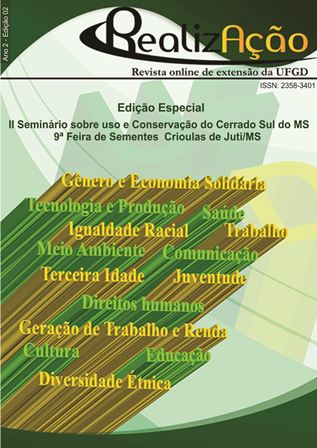Implementation of an agroforestry system in education for sustainability in Bonito, MS, Brazil
Keywords:
Environmental education, Agroecology, Biodiversity, Teaching-learningAbstract
Reflection on social practices for the development of actions that contribute to biodiversity conservation involves a necessary articulation with the production of meanings about environmental education. Based on the extension project “Sustainability and Agroecology”, practices were implemented combined with theoretical study, seeking environmental education for sustainability in the municipality of Bonito, MS. The target audience of the proposal was a class of twenty students in the 3rd year of high school. Two questionnaires, one before and one after the educational actions, were applied to obtain data on prior knowledge and on the results of the educational process, respectively. Interactive and participatory classes continued, focusing on agroforestry systems (AFS) and sustainability. Field practices included a technical visit to an agroecological property that has an AFS implemented and in operation. The principles of sustainability and agroecology were observed on site. In a new area in the rural area of the municipality, a SAF was implemented, where students planted various crops. The results were shared with the school community at the end of the work. Considering the cultural diversity and the individual's own characteristics, in the end, a positive balance was evident in the teaching-learning process.
Downloads
References
BRASIL. Lei n º. 9.795, de 27 de abril de 1999. Dispõe sobre a educação ambiental, institui a Política Nacional de Educação Ambiental e dá outras providências. Brasília: Senado Federal. 1999.
CAPORAL, F. R.; COSTABEBER, J. A. Agroecologia: alguns conceitos e princípios. Brasília : MDA/SAF/DATER-IICA, 24 p., 2004.
DIAS, B. F. de S. A implementação da convenção sobre diversidade biológica no Brasil: desafios e oportunidades. Campinas: Fundação Tropical de Pesquisas e Tecnologia. p.10. 2000.
Dicio - Dicionário Online de Português. 2013.
IBGE - Instituto Brasileiro de Geografia e Estatística. Censo demográfico 2010. Rio de Janeiro: 2010.
JACOBI, P. Educação Ambiental, Cidadania e Sustentabilidade. Programa de Pós-graduação em Ciência Ambiental da USP. Cadernos de Pesquisa, n. 118, 3 março, 2003.
MACEDO, R. L. G.; VENTURIN, N.; TSUKAMOTO FILHO, A. A. Princípios básicos para o manejo sustentável de sistemas agroflorestais. Lavras: UFLA/ FAEPE. 2000.
McHALE, M. R.; McPHERSON, E. G.; BURKE, I. C. The potential of urban tree plantings to be cost effective in carbon credit markets. Urban Forestry and Urban Greening, v.6, p.46-60, 2007.
ONU – Organização das Nações Unidas (United Nations). Our Common Future (Report Brundtland). World Commission on Environment and Development, 318p. 1987.
PÓVOA, I. C. F.; Silva, N. S.; Silva, M. R. A. Biodiversidade e Desenvolvimento Sustentável. X Encontro Latino Americano de Iniciação Científica e VI Encontro Latino Americano de Pós-Graduação – Universidade do Vale do Paraíba Universidade do Vale do Paraíba - Programa de Pós Graduação em Ciências Biológicas. 2006.
SANT’ANA, P. J. P. e ASSAD, A. L. O Contexto brasileiro para a bioprospecção: a competência científico tecnológica brasileira, Biotecnologia, n. 29, p. 32-37, 2001.
TILMAN, D. FORGIORE, J., BRIAN, W., D’ANTONIO, C., DOBSON, A., HOWARTH,R., SCHINDLER, D., SCHLESENGER, W.H., SIMBERLOFF, D., SWACKHAMER, D. Forecasting agriculturally driven global environmental change. Science, v. 292, p. 281-284. 2001.
Downloads
Published
How to Cite
Issue
Section
License
Copyright (c) 2014 Carmen Beatriz Reiss Zavala, Ana Caroline Gomes Abreu, Cristiane Almiron Batista de Freitas, Zefa Valdivina Pereira, Valter Vieira Alves Junior

This work is licensed under a Creative Commons Attribution-NonCommercial-ShareAlike 4.0 International License.
Autores que publicam nesta revista aceitam as normas de publicação, bem como, concordam com os seguintes termos:
(a) O Conselho Editorial se reserva ao direito de efetuar, nos originais, alterações da Língua portuguesa para se manter o padrão culto da língua, respeitando, porém, o estilo dos autores.
(b) Autores mantêm os direitos autorais e concedem à revista o direito de primeira publicação, com o trabalho simultaneamente licenciado sob a Creative Commons Atribuição-NãoComercial-CompartilhaIgual 4.0 Internacional que permite: Compartilhar — copiar e redistribuir o material em qualquer suporte ou formato e Adaptar — remixar, transformar, e criar a partir do material. A Creative Commons Atribuição-NãoComercial-CompartilhaIgual 4.0 Internacional considera os termos seguintes:
- Atribuição — Você deve dar o crédito apropriado, prover um link para a licença e indicar se mudanças foram feitas. Você deve fazê-lo em qualquer circunstância razoável, mas de nenhuma maneira que sugira que o licenciante apoia você ou o seu uso.
- NãoComercial — Você não pode usar o material para fins comerciais.
- CompartilhaIgual — Se você remixar, transformar, ou criar a partir do material, tem de distribuir as suas contribuições sob a mesma licença que o original.
- Sem restrições adicionais — Você não pode aplicar termos jurídicos ou medidas de caráter tecnológico que restrinjam legalmente outros de fazerem algo que a licença permita.


